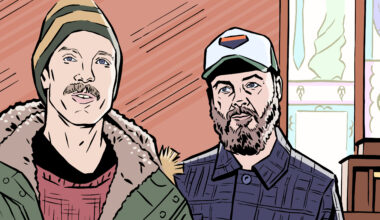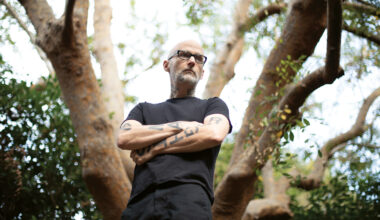Soundtracking low-budget British film ‘Moon’ was an experience that combined Clint Mansell’s love of Bowie, modern morality and a lifetime of sci-fi into one of his most meaningful projects. The composer tells us how science fiction offers a mirror to mankind
“It’s kind of difficult to remember what your actual memories are, and what are just things you’ve accumulated over time,” says Clint Mansell. The renowned soundtrack composer is trying to decide what he recalls of the Apollo 11 mission. “Landing on the Moon was 50 years ago, I was six years of age. I’ve seen that footage millions of times now, but I don’t remember if I saw it live at the time. All these things, it’s hard to say whether you’ve actually experienced them, or whether you’ve grown up with them. You know?”
We don’t. But that’s the point – it’s the first of many appropriate links to the film we’re discussing today.
‘Moon’, released in 2009, around the 40th anniversary of the landings, was the directorial debut from Duncan Jones (AKA David Bowie’s son). Written by Nathan Parker and produced for a tiny budget, it tells the story of Sam Bell (Sam Rockwell in a break-out performance), the sole worker at a helium-3 mine on the dark side of the Moon. One day, while working outside, Sam has an accident, and finds himself inside the base when he regains consciousness.
The event sets off a chain reaction that leads to Sam discovering that not only is he not alone, he’s not even who he thought he was. The film was critically adored and earned a BAFTA nomination, but, more importantly, it rekindled the film world’s interest in sci-fi, setting the template for thoughtful, stylish and unsettling explorations of human frailty, often in the face of human progress. For Mansell, it represented a chance to exhibit his own long-held sci-fi credentials, crafted across countless viewings of ‘2001: A Space Odyssey’ and ‘Silent Running’.
“Space was just a huge thing, growing up,” recalls Mansell. “As a kid you just look at things like ‘Thunderbirds’ or ‘Space 1999’, ‘UFO’. Then ‘Space Oddity’, with Bowie. ‘I’m The Urban Spaceman’ from the Bonzo Dog Doo-Dah Band. It was a cultural explosion, in a way, that hadn’t been as all-consuming since the Industrial Revolution: something that actually affected everybody everywhere. Space just became this, in the words of Star Trek’, ‘final frontier’. It became an expansion of the human psyche I suppose. It feels very much like, now, we’re moving into an era where we’re trying to shut down those things. Now it’s, ‘Well, this is a good idea, but let’s try to sell it to somebody.’ That’s part of the thing that I think has changed us.”
This stuff matters to Mansell. He sees the value in science fiction as an open medium for expression. The former Pop Will Eat Itself frontman has always had a somewhat anarchic approach to creativity, yet it was growing up with comic books, sci-fi and, in particular, the appearance of an extra terrestrial rock star by the name of Ziggy Stardust on ‘Top Of The Pops’ that provided a cultural awakening to the young Clint.
“‘Starman’ and the ‘Ziggy Stardust’ album, for me, were very liberating,” says Mansell. “And, yeah, he’s talking about a spaceman, but you’re unshackled from the judgements, rules and regulations of an Earthbound society with that. Somebody said to me the other week, you can tell any story you want, you can make any sort of parallel Earth you want within a sci-fi film. You can bring up all sorts of metaphors. It’s very difficult to do that in other things, because people shy away from them.
“What Bowie did with ‘The Rise And Fall Of Ziggy Stardust’ was basically introduce these concepts of sexuality, or the end of the world, or drugs in a way that could be processed by somebody like me, who was only eight or nine at the time. I knew he was talking about and thinking about strange things that I didn’t really understand, but I was still drawn to them.”

Over 30 years, that creative acquaintanceship transported Mansell from his Midlands bedroom, to the pop charts with PWEI, and then off to the US in pursuit of a career as a soundtrack composer. By 2009, a fruitful partnership with Darren Aronofsky had already produced seminal work on ‘Requiem For A Dream’ and ‘The Wrestler’, alongside monied mega productions like ‘Smokin’ Aces’ and ‘Definitely, Maybe’, not to mention 20 or so other films and shorts. Essentially, he was well past the point of needing to take a low budget gig like ‘Moon’.
“The only thing I’m really interested in is doing something good,” says Mansell. “And I’ve learnt over the years that most good things don’t usually have a lot of money to them. I’m still that kid, inside. I have a very tough problem with authority, particularly in the artistic world. When I come up against studio people, it stands in the way of doing something of quality, as far as I’m concerned. They’re just talking about what’s going to make this film successful, and I can’t fucking deal with that. But when I read Nathan Parker’s script… I mean, I still think it’s the best script I’ve ever read. It really does question what it is to be human. What is it to be lonely? What is it to have someone else’s memories? I’ve just been reading Alan Moore’s ‘Swamp Thing’ and that is similar, taking something that isn’t human and using it to figure out what it is to be human. So ‘Moon’ had all the elements that I look for in something to inspire me, or be excited about.”
Was Jones’ Bowie connection persuasive for such a mega fan, too?
“Well, I’d actually got to know Bowie a little bit prior to that,” says Mansell. “He came to talk with me and Darren about working on ‘The Fountain’ in 2005, so I spent a bit of time with him playing my demos, which just completely blew my mind. It was the weirdest idea you can possibly imagine. Here’s this person that set you on the path of what you’re doing, and some 40 years later you’re playing him your music.
“He was a very likeable, very funny, very engaging, very open person. But the first meeting… it’s like fucking David Bowie, Christ! It was in New York, and we met at Philip Glass’ studio. It was all fantastic, but when I got back to the hotel I just completely collapsed, the energy just drained out of me. This guy was monumental in my life, there’s no two ways about it. I remember Duncan being born. I was a Bowie fan then, and obviously his music affected me. But years later, to work with his son, and do something that in my catalogue is in my top two or three works, well, I’m immensely proud of it.”
Mansell often describes himself as a “method composer”, meaning he likes to fully immerse himself in a project, learning everything he can before putting hand to keyboard. ‘Moon’, however, was different.
“‘Moon’, and ‘The Fountain’, if you like, I know it sounds completely preposterous and ridiculous, but I was kind of preparing for them all my life,” he says. “I knew science fiction. I knew emotion in films. I knew emotion in music. These films came along and I almost didn’t have to do any research for them. They were so ingrained in me. Something that is almost, not second nature, but part of you. In a way, they bring out of you what’s already there.”
The ‘Moon’ soundtrack treads a remarkable line, a sparse palette of synths, strings and pianos at once reflecting the repetitive nature of Sam’s contracted servitude, the flickering hope amid his existence in this barren, isolated environment, and the bewildering emotional journey he undergoes as he pieces together the real story.
“For me, ‘Moon’, principally, was about humanising and connecting with Sam,” says Mansell. “Feeling his pain, and feeling his excitement at going home, feeling his fucking devastation at not getting home, and devastation at finding out that he’s not even real. So to feel him is to feel something in the movie.
“Science fiction has a reputation for being antiseptic and clinical, but I never really bought into that idea. There were such a lot of ideologies being dealt with, that this was a distinctly human story. It’s a love letter to being human to some degree, and I wanted that emotion in there.”
Mansell is right to assess it as one of his best works. It’s one of those themes that has gone on to live a life beyond the film, that sticks with you even if you haven’t seen the movie. It works, inherently, because of Mansell and Jones’ shared understanding of sci-fi culture and the metaphor of commerce vs community that has long permeated the genre. It’s in the instrumentation’s subtle moves from electronic to analogue as the film progresses, the leitmotif that returns at crucial moments, and within that the repetitive, mechanical piano riff that occasionally drops and subverts. The score, like Sam, lives and breathes, struggles to break its chains, to become human.
“Obviously, there’s a very pre-programmed and laid out repetitive mission for these clones,” says Mansell, when we ask about the theme. “I thought, ‘That’ll be the same piece of music Sam Bell 4 is hearing when he’s jogging on the running machine as Sam Bell 2’. So there is that, but there’s also just a part of me that likes repetition, it makes me feel good. When I find the right piece, then it really makes me feel good.”
Mansell has often spoken about the odd way that anxious music can balance out his personal anxiety – if he finds something that alleviates that, then he pursues it. There’s certainly something of that in his ‘Moon’ soundtrack.
“If I find the right anxious tone of music, it somehow alleviates the tone, the anxiety in me,” says Mansell. “It’s like getting out of phase with it, like they give Ritalin to hyperactive kids, which is actually a form of speed, but it calms them down. You can put music out of phase and lose certain elements, but I don’t know whether it’s actually the anxiety that I create in the music that gets rid of my anxiety, or whether it’s really just the fact that I get lost in it.”
Anxiety is often an isolating experience, we note. Was there any empathy on Mansell’s part for Sam, in that sense?
“Yeah, I’d been living in America for well over 10 years by that point, and I’d moved to Los Angeles a few years before ‘Moon’. I led a very isolated life. I think most composers will tell you it’s a very solitary existence. So there’s a certain sort of parallel that you can adopt with it, without having to find out that I’m a clone! But, at the end of the day, the ‘What it’s all about? What does it all mean?’ idea still exists. Why do any of us do any of these things? There’s a lot that you can mine from it. Science fiction allows many other things to come into it, not just, ‘Oh, he’s a bloke in space’.”
The best sci-fi, like all good art, exists out of its own time because it says something about humanity. Like the Moon landings and the subsequent loss of public interest – leading to the closure of the Apollo space programme just three years later – ‘Moon’ encapsulates that crumbled optimism. The selling of a dazzling future dream that becomes defined by everything it is not.
“I don’t think that those themes have got jaded in the interim,” says Mansell, when I ask how he feels it’s aged. “In many ways, they’re becoming more profound as we divide among ourselves even further. For instance, you talk about exploitation of the worker, even if that worker isn’t human. But that’s very prevalent in what’s gone on with zero hours contracts. We’re almost dehumanising the workforce because they’re there for a certain job and that job is to make money. We don’t care about them.”
Indeed, consider the current idea that we are so dazzled by the convenience of big tech that we ignore the distance it can place between cause and effect – between the warehouse worker afraid to use the toilet and the customer who wants a new gizmo, yesterday. The hypocrisy of the “caring consumer” afraid to peep behind the curtain. It’s all there in ‘Moon’.
“These are the moral choices that we always come down on the wrong side of,” says Mansell. “We’re at a point where we haven’t learned that just because we can do something, that perhaps we shouldn’t do it. ‘Moon’ kind of shows us that. Again, the moral choice is outweighed by the monetary choice.”
It makes the optimism inherent in the initial Space Race, the Moon landings and the expansive view of sci-fi itself, feel all the more crucial.
“You go back to Kennedy’s speech about going to the Moon, these challenges that were beyond us. There was a more human development feeling then, rather than developing a bank balance. And ‘Moon’, as a film, is a perfect example of that. It wasn’t part of anything that was going on at the time. It was just purely in its own world: it created its own environment, its own themes. It was a piece of work true to itself.”






